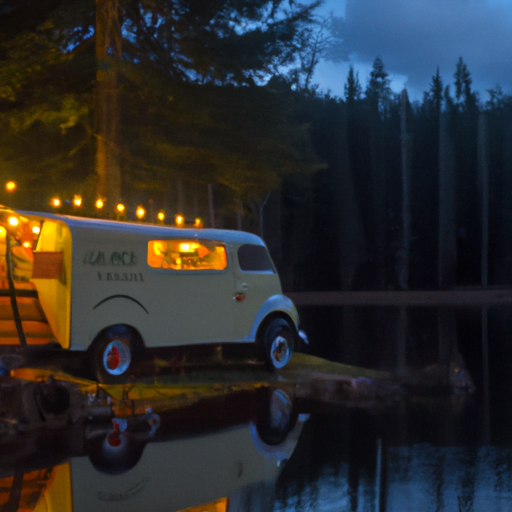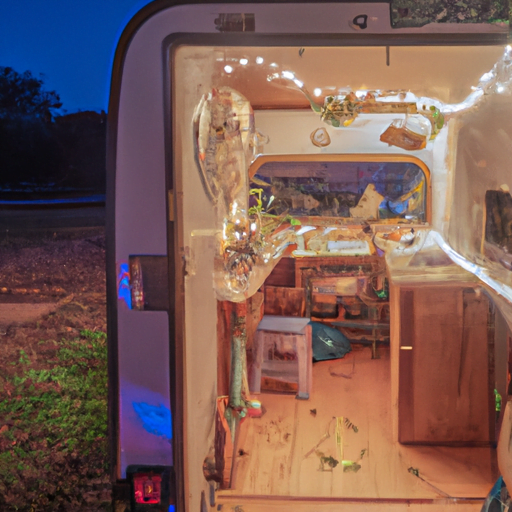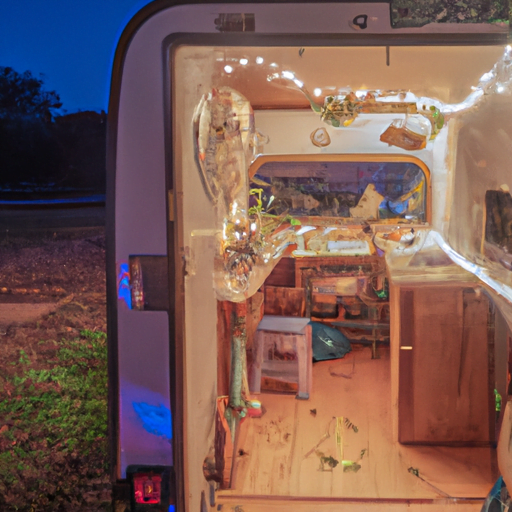Have you noticed how many people are opting for off grid living these days? It seems like every time you turn around, someone else is selling their belongings, converting a van, and hitting the road. But why is this lifestyle becoming so popular? Well, there are a few reasons, and in this article, we’ll dive deeper into this fascinating trend.
One of the main reasons why off grid living is becoming popular is the desire for freedom and adventure. People are tired of the traditional 9-to-5 grind and are seeking a more flexible and unconventional way of life. Living in a van allows individuals to have the freedom to travel wherever their heart desires, without being tied down to a specific location. It’s a way to explore different landscapes, experience new cultures, and create unforgettable memories.
Another factor contributing to the rise of off grid living is the growing concern for the environment. Many van dwellers are choosing this lifestyle in order to minimize their carbon footprint and live a more sustainable life. By generating their own power through solar panels or using alternative energy sources, they are able to reduce their reliance on fossil fuels and decrease their impact on the planet. This aspect of off grid living is appealing to those who want to live in harmony with nature and make a positive difference.
Moreover, the cost of traditional housing is skyrocketing in many areas, making it difficult for some to afford their own homes. Off grid living provides a more affordable option for individuals, allowing them to bypass hefty mortgages or rental fees. By downsizing their belongings and living in a van, people can save money on monthly expenses and allocate their funds towards experiences and personal growth.
In conclusion, off grid living in a van is gaining popularity for various reasons. Whether it’s the desire for freedom and adventure, the commitment to living sustainably, or the need for a more affordable housing option, this lifestyle appeals to a wide range of individuals. If you’re curious to learn more about the ins and outs of off grid living, be sure to check out our upcoming article where we delve into the practical aspects and challenges of this unique lifestyle.

Exploring the Appeal of Off Grid Living
In recent years, there has been a growing trend of people opting for a unique and alternative lifestyle – living off grid in a van. This unconventional way of life has captured the imagination of many, offering a sense of freedom, minimalism, and a reduced environmental impact. But what exactly is off grid living, and why is it becoming so popular?
Benefits of Off Grid Living
One of the primary reasons why off grid living has gained popularity is the sense of freedom it provides. Living off grid means detaching oneself from traditional societal norms and expectations. It allows individuals to break free from the constraints of the modern world and live life on their own terms. In a society where we are constantly bombarded with rules and regulations, off grid living offers a chance to escape and find true autonomy.
Another appeal of off grid living is the minimalist lifestyle it promotes. Living in a van requires individuals to downsize their belongings and live with only the essentials. This stripped-down existence allows for a sense of clarity, as it forces individuals to prioritize what is truly important in life. By removing the clutter and distractions of material possessions, people can focus on experiences, relationships, and personal growth.
Additionally, off grid living has a significantly reduced environmental impact compared to traditional living. By living in a van, individuals consume less energy, produce less waste, and have a smaller carbon footprint. This sustainable lifestyle choice aligns with the growing concern for the environment and allows individuals to live in harmony with nature.
Transitioning to a Van Lifestyle
While the idea of off grid living may sound appealing to many, making the transition to van life requires careful planning and consideration. Understanding the van life movement and its increasing popularity and accessibility is crucial.
Understanding the Van Life Movement
The van life movement is a lifestyle choice embraced by individuals who choose to live and travel in their vans. It is a community of like-minded individuals who value simplicity, adventure, and freedom. Through social media platforms and online forums, the van life movement has gained traction and has become a source of inspiration for people seeking a different way of life.
Increasing Popularity and Accessibility
The increasing popularity of van life can be attributed to a variety of factors. One of the main reasons is the advances in technology, making it easier for individuals to live off grid. Solar panels, portable generators, and water filtration systems have made self-sufficiency on the road more attainable. The rise of remote work opportunities and the freedom offered by the internet has also made it possible for people to live and work from their vans, further fueling the appeal of van life.
Choosing the Right Vehicle
Selecting the right vehicle is an essential step in transitioning to a van lifestyle. Factors such as size, reliability, fuel efficiency, and maintenance costs should be taken into consideration. Popular choices include camper vans, converted cargo vans, and school buses, each with their own pros and cons.
Converting a Van into a Livable Space
Converting a van into a livable space is where creativity and resourcefulness come into play. From insulation and flooring to storage solutions and electrical systems, every detail must be carefully thought out to maximize livability and functionality. Many resources are available online, including step-by-step guides and video tutorials, making the conversion process more accessible for beginners.
Challenges and Rewards of Living in a Van
While van life offers a plethora of benefits, it also comes with its fair share of challenges. Embracing simplicity and adaptability is key to a fulfilling van life experience.
Embracing Simplicity and Adaptability
Living in a van necessitates embracing a simpler way of life. With limited space, individuals must learn to let go of material possessions and adapt to a smaller living environment. While this may initially be challenging, many van dwellers find that this newfound simplicity brings a greater sense of peace and contentment.
Navigating Limited Space
One of the main challenges of living in a van is the limited space. Every square inch of the van must be utilized efficiently to create functional living areas. Clever storage solutions, multifunctional furniture, and creative organization techniques are essential to make the most of the available space. While it may require some adjustment, many van dwellers find that living in a small space encourages them to prioritize experiences over material possessions.
Managing Basic Amenities
Living off grid means being self-sufficient when it comes to basic amenities. Water, electricity, and waste management are aspects that need careful planning and management. Installing a water storage system, utilizing solar power, and implementing composting toilets are common solutions among van dwellers. Learning how to effectively manage these basic amenities is essential for a comfortable and sustainable van life experience.
Connecting with Nature
One of the most rewarding aspects of van life is the opportunity to connect with nature on a deeper level. With the freedom to choose their own destinations and explore remote areas, van dwellers have the chance to immerse themselves in the natural beauty that surrounds them. Whether it’s waking up to a breathtaking sunrise in a national park or falling asleep under a sky filled with stars, van life provides unparalleled access to nature’s wonders.

Financial Considerations for Van Dwellers
One of the factors that draw people to van life is the potential for financial freedom. However, it is important to consider the financial aspects and plan accordingly.
Cost Savings and Debt Reduction
Living in a van can significantly reduce living expenses. With no mortgage or rental payments, van dwellers enjoy considerable cost savings. Additionally, the ability to limit discretionary spending and prioritize experiences over material possessions can lead to significant debt reduction and financial independence.
Budgeting for Van Living
Despite the cost savings, van life still entails expenses. Fuel, maintenance, insurance, food, and unexpected costs should be factored into the budget. It is essential to create a comprehensive financial plan to ensure a sustainable and enjoyable van life experience.
Income Generation on the Road
Many van dwellers sustain their lifestyle by generating income while on the road. Remote work opportunities, freelance jobs, and online businesses are popular options. Cultivating multiple streams of income and embracing a flexible work schedule can provide the financial stability necessary to sustain van life.
Exploring Workamping Opportunities
Workamping is a unique opportunity for van dwellers to exchange their labor for free or discounted campsite accommodations. From campgrounds and national parks to seasonal work positions in various industries, workamping allows individuals to explore new locations while earning a living.
Safety and Security Measures
Ensuring personal safety and protecting one’s belongings are critical considerations for van dwellers. Implementing safety and security measures can provide peace of mind while living on the road.
Ensuring Personal Safety
As with any lifestyle, personal safety is of utmost importance. Van dwellers should adopt basic safety practices such as locking doors, staying aware of their surroundings, and avoiding risky situations. It is also important to trust one’s intuition and exercise caution when interacting with strangers.
Protecting Belongings
Living in a van means that all belongings are stored within the vehicle. Taking precautions to protect personal possessions from theft or damage is crucial. Utilizing secure locks, installing alarms, and being mindful of where and when valuables are displayed can reduce the risk of theft.
Securing Parking Spots
Finding safe and legal places to park overnight is an ongoing challenge for van dwellers. Researching and utilizing resources such as online forums, mobile apps, and local knowledge can help identify suitable parking spots. Remaining respectful of local communities and adhering to parking regulations is essential to maintain positive relationships and avoid legal issues.
Managing Health and Emergencies
Having a plan in place for health emergencies is vital for van dwellers. Maintaining health insurance coverage and carrying a well-stocked first aid kit is essential. Understanding emergency protocols, knowing nearby medical facilities, and having a reliable means of communication are crucial for peace of mind while living on the road.
Community and Social Aspect of Van Life
While van life may evoke images of solitary living, the reality is that van dwellers form a strong and supportive community. Connecting with like-minded individuals, building support networks, and sharing experiences are all part of the van life journey.
Finding Like-Minded Individuals
The rise of social media and online forums has made it easier than ever to connect with other van dwellers. Facebook groups, Instagram accounts, and van life forums provide platforms for individuals to share their stories, seek advice, and connect with others who are on a similar path.
Building Support Networks
The van life community is known for its camaraderie and willingness to help one another. From mechanical advice to recommendations for campsites and local attractions, the shared knowledge and support within the community are invaluable. Building relationships and participating in meet-ups and gatherings can provide a sense of belonging and support.
Sharing Experiences and Tips
Sharing experiences and tips is a common practice among van dwellers. Whether it’s through personal blogs, YouTube channels, or social media platforms, many van lifers document their journeys and provide insights and advice for those just starting out. This exchange of knowledge and experiences fosters a sense of community and encourages others to embrace the van life lifestyle.
Organizing Meet-ups and Gatherings
Organizing meet-ups and gatherings is another way the van life community connects in person. From regional gatherings to large-scale van life festivals, these events offer opportunities for individuals to socialize, learn from one another, and create lifelong friendships. These gatherings provide the chance to share stories, swap van life tips, and build a sense of community.
Sustainable Living on the Road
Living on the road presents unique opportunities to embrace a sustainable lifestyle. Van dwellers often lead the way in implementing eco-friendly practices and minimizing their environmental impact.
Implementing Eco-Friendly Practices
Van dwellers are known for their commitment to sustainable living practices. This includes minimizing waste, conserving resources, and practicing Leave No Trace principles. Utilizing reusable products, recycling, and choosing sustainable materials for van conversions are common practices for those living the van life.
Utilizing Renewable Energy Sources
Solar power is a popular choice among van dwellers for harnessing renewable energy. Installing solar panels on the roof of the van allows for self-sufficiency in energy production. This reduces reliance on traditional power sources and minimizes the environmental impact of van life.
Minimizing Waste and Consumption
Living in a small space naturally lends itself to conscious consumption. With limited storage, individuals must carefully consider what they truly need. This minimalistic approach helps reduce waste and encourages the adoption of sustainable consumption habits. Many van dwellers also prioritize using bulk bins, composting, and utilizing refillable and reusable products to further minimize waste.
Supporting Local Communities
Van dwellers often strive to support local communities along their journeys. By frequenting farmer’s markets, local businesses, and supporting artisans and craftsmen, van dwellers contribute to local economies. This encourages sustainable practices, reduces dependence on big corporations, and fosters a sense of connection with the places they visit.
Legal Considerations and Regulations
When living in a van, it is important to understand and comply with local laws, regulations, and permits to avoid legal issues.
Understanding Local Laws and Ordinances
Each location has its own set of laws and ordinances regarding parking, camping, and overnight stays. It is essential for van dwellers to research and understand these regulations to ensure they are abiding by the rules and maintaining positive relationships with local communities.
Finding Overnight Parking and Camping Areas
Finding safe and legal places to park overnight can be challenging. Understanding local parking regulations, utilizing designated camping sites, and seeking permission from landowners are important considerations. Mobile apps, websites, and online forums can be helpful resources for finding suitable overnight parking spots.
Navigating Vehicle Registration and Insurance
Proper vehicle registration and insurance are vital for van dwellers. Requirements vary from state to state and country to country, so it is crucial to understand and comply with the regulations to avoid legal issues. Additionally, securing appropriate insurance coverage for the van and its contents is essential for protection and peace of mind.
Dealing with Zoning and Permits
Some areas have zoning restrictions that may limit or prohibit van dwelling. It is important to research and understand these restrictions before choosing a location. In certain cases, obtaining permits or seeking alternative housing options may be necessary to comply with local regulations.
Maintaining Mental Health and Well-being
While van life offers freedom and connection to nature, it is essential to address the challenges that may impact mental health and well-being.
Addressing Loneliness and Isolation
Living in a van can sometimes lead to feelings of loneliness and isolation. To combat this, many van dwellers actively seek social connections through online communities, meet-ups, and gatherings. Engaging in hobbies, exploring new places, and reaching out to fellow van dwellers can provide a sense of companionship and support.
Cultivating Mindfulness and Gratitude
Van life provides an opportunity for individuals to live in the present moment and cultivate mindfulness. Being surrounded by nature and embracing simplicity encourages a deeper appreciation for the small joys in life. Practicing gratitude and mindfulness techniques can enhance mental well-being and overall satisfaction with the van life lifestyle.
Seeking Social Support
Maintaining social connections is crucial for mental well-being. Building and nurturing relationships, whether with other van dwellers, friends, or family members, provides a sense of belonging and support. Regular communication, both online and offline, can help combat feelings of loneliness and provide a support system during challenging times.
Balancing Personal Growth and Stability
Living in a van offers a unique opportunity for personal growth and self-discovery. Embracing the challenges and uncertainties of van life can lead to personal development, resilience, and adaptability. However, it is also important to maintain a sense of stability and routine to support mental well-being. Balancing personal growth with stability is crucial for a sustainable and fulfilling van life experience.
Conclusion: Embracing an Alternative Lifestyle
Off grid living, specifically living in a van, has become increasingly popular due to its appeal in terms of freedom, minimalism, reduced environmental impact, and financial freedom. The van life movement has provided a community for like-minded individuals seeking an alternative lifestyle. While van life does come with its challenges, embracing simplicity, being resourceful, and connecting with nature can result in a sustainable and fulfilling life on the road. So, if you’re yearning for adventure, a closer connection to nature, and a break from the constraints of society, van life may just hold the key to a truly transformative and fulfilling way of living.




